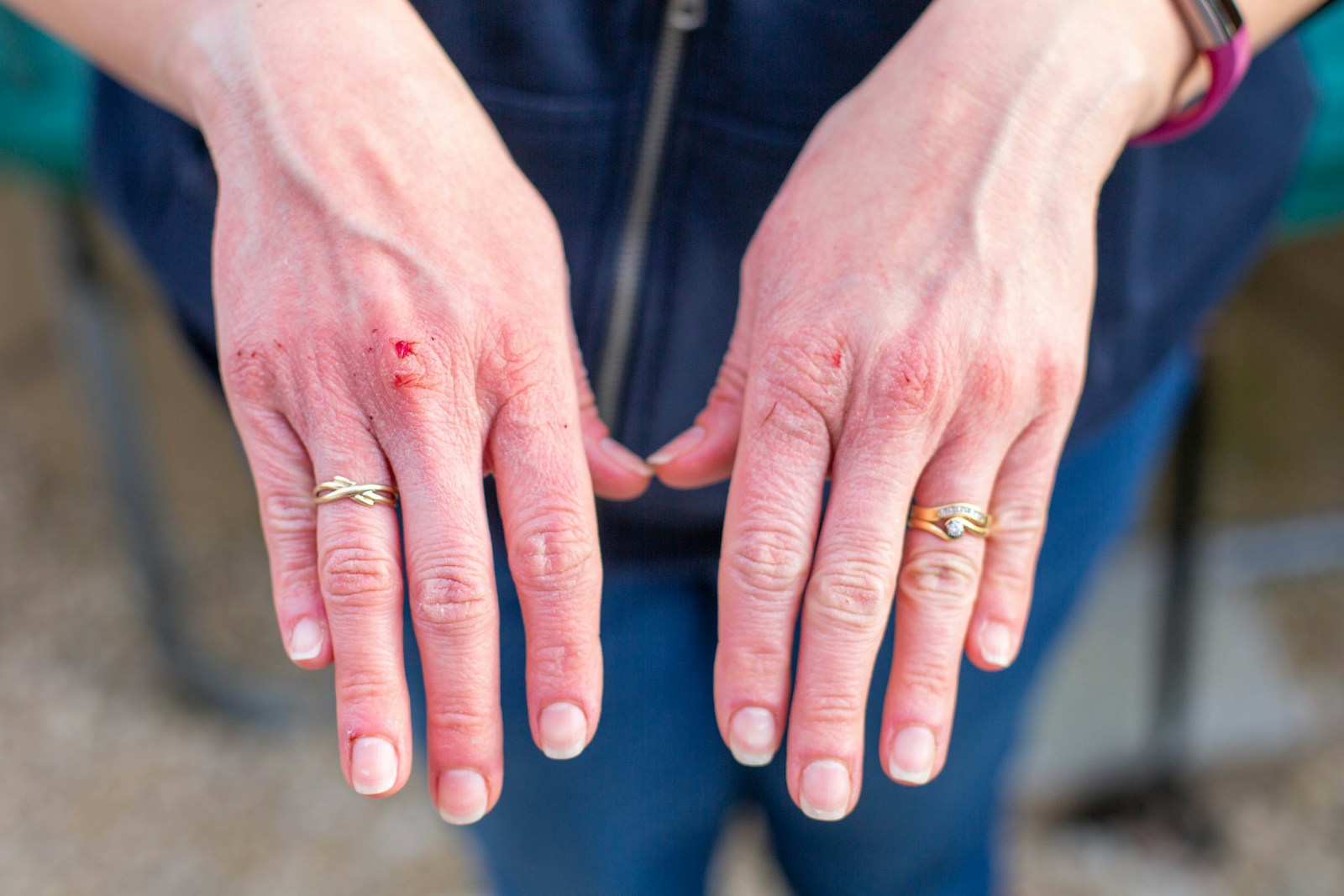How To Get Rid Of Canker Sores
The Basics of Canker Sores: Causes and Symptoms
Canker sores, also known as aphthous ulcers, are painful, shallow sores that form on the inside of the mouth, including the tongue, gums, and inner lips. Unlike cold sores, which are caused by the herpes simplex virus, canker sores are not contagious. They generally heal on their own within one to two weeks, but they can cause discomfort and make it difficult to eat or speak.
Causes of Canker Sores:
The exact cause of canker sores remains unclear, although various factors can trigger their development. These can include:
- Minor mouth injury: Accidental biting, aggressive brushing, or dental work can lead to the development of canker sores.
- Foods: Certain acidic or spicy foods like citrus fruits, tomatoes, chocolates, and coffee can irritate the lining of the mouth and trigger canker sores in susceptible individuals.
- Stress: Emotional or physical stress can weaken the immune system, making a person more prone to developing canker sores.
- Hormonal changes: Some women may experience canker sores during menstruation due to hormonal fluctuations.
- Underlying health conditions: In some cases, canker sores can be linked to nutritional deficiencies, gastrointestinal disorders, or immune system disorders like celiac disease or HIV/AIDS.
Symptoms of Canker Sores:
Canker sores may vary in size and appearance, but they commonly share the following symptoms:
- Painful sensation: Canker sores are often preceded by a tingling or burning sensation, followed by the formation of a small, round, or oval-shaped sore with a white or yellowish center and a red border.
- Difficulty eating and speaking: Due to their location inside the mouth, canker sores can make eating, drinking, and speaking uncomfortable.
- Localized swelling: The surrounding area of the canker sore may appear slightly swollen and red.
- Sensitivity to certain foods: Spicy, acidic, or salty foods can exacerbate the pain and discomfort associated with canker sores.
While canker sores can be bothersome, there are several self-care measures and home remedies that can help alleviate symptoms and promote healing. Maintaining proper oral hygiene, avoiding trigger foods, and using over-the-counter pain relievers or topical ointments are some effective ways to manage canker sores at home. Remember, if the sores persist for more than two weeks, are accompanied by severe pain, or are recurring frequently, it is recommended to consult a healthcare professional for further evaluation and appropriate treatment options.
Treating Canker Sores: Effective Home Remedies
Canker sores, also known as aphthous ulcers, are painful sores that develop inside the mouth. They can make it uncomfortable to eat, drink, or talk. While the exact cause of canker sores is unknown, they are believed to be triggered by a variety of factors, including stress, injury to the mouth, certain foods, hormonal changes, or a weakened immune system.
Fortunately, there are several effective home remedies that can help alleviate the pain and promote healing of canker sores. Here are some tried and tested remedies that you can try:
- Saltwater rinse: A simple saltwater rinse can help reduce inflammation and promote healing of canker sores. Dissolve half a teaspoon of salt in a cup of warm water and swish it around in your mouth for a few seconds before spitting it out. Repeat this several times a day for best results.
- Baking soda paste: Baking soda has alkaline properties that can help neutralize the acidity in the mouth and relieve pain caused by canker sores. Mix one teaspoon of baking soda with a little water to form a paste. Apply the paste directly onto the sore and leave it on for a few minutes before rinsing it off. Repeat this a few times a day until the sore improves.
- Honey: The antimicrobial and healing properties of honey can help soothe canker sores and speed up the healing process. Dab a small amount of honey directly onto the sore and leave it on for as long as possible. Repeat this several times a day until the sore disappears.
- Coconut oil: Coconut oil has anti-inflammatory and antimicrobial properties that can help reduce pain and promote healing of canker sores. Apply a small amount of coconut oil directly onto the sore and leave it on for as long as possible. Repeat this several times a day for relief.
- Aloe vera: The gel from an aloe vera plant has soothing and healing properties that can provide relief from canker sores. Apply a small amount of aloe vera gel directly onto the sore and leave it on for as long as possible. Repeat this several times a day until the sore heals.
In addition to these home remedies, it is important to avoid certain foods and drinks that can irritate the canker sores, such as acidic fruits, spicy foods, and carbonated beverages. It is also advisable to maintain good oral hygiene by brushing and flossing regularly and using a soft-bristled toothbrush.
While most canker sores heal on their own within one to two weeks, if you experience frequent or severe canker sores that don’t improve with home remedies, it is recommended to consult a healthcare professional. They may prescribe topical medications or recommend further evaluation to rule out underlying medical conditions.
Remember, natural home remedies can provide relief and promote healing for canker sores, but if the condition persists or worsens, seeking professional advice is always the best course of action.
Effective Over-the-Counter Products to Relieve Canker Sore Pain
Canker sores can be quite painful and uncomfortable, making it essential to find effective remedies to alleviate the pain and promote healing. While there are several over-the-counter (OTC) products available, it’s important to choose the ones that are specifically designed to treat canker sores. Here are some effective OTC products to help relieve canker sore pain:
- Topical Analgesics: Over-the-counter topical analgesics, such as benzocaine, can provide temporary pain relief by numbing the affected area. These products usually come in the form of gels, ointments, or sprays and can help reduce the discomfort associated with canker sores. Apply a small amount of the product directly to the sore, following the instructions on the packaging.
- Oral Rinses: Antimicrobial mouth rinses can help reduce the pain and inflammation caused by canker sores while also promoting healing. Look for a rinse that contains ingredients like hydrogen peroxide or chlorhexidine gluconate. Use the rinse as directed, typically by swishing it around in your mouth for about 30 seconds, then spitting it out. Avoid swallowing the rinse.
- Barrier Creams and Gels: Barrier creams and gels create a protective layer over the canker sore, shielding it from irritation and helping to speed up the healing process. Look for products that contain ingredients like sucralfate or hydrogels. Apply a thin layer of the cream or gel directly to the sore, following the instructions on the packaging.
- Pain Relief Gels: Some OTC gels specifically target canker sore pain by combining ingredients like benzocaine, menthol, or phenol. These gels provide temporary relief by numbing the area and soothing the pain. Follow the instructions on the packaging for proper application.
- Oral Pain Relieving Patches: These patches contain numbing agents such as benzocaine that adhere to the canker sore, providing long-lasting relief. Apply the patch to the affected area, ensuring it stays in place for the recommended duration.
When using any OTC product for canker sore relief, it’s important to read and follow the instructions carefully. If your symptoms persist or worsen despite using OTC products, consult a healthcare professional for further evaluation and treatment options.
Remember that while OTC products can provide relief, they are not a substitute for proper oral hygiene and a healthy lifestyle. Maintain good oral hygiene practices, including regular brushing and flossing, and avoid triggering factors such as spicy or acidic foods that may irritate the canker sores. With proper care and the right OTC products, you can effectively manage the pain and discomfort associated with canker sores, allowing them to heal more quickly.
READ ALSO: How To Get Rid Of Stretch Marks
Best Practices for Preventing Canker Sores
Canker sores, also known as aphthous ulcers, are small, painful lesions that develop inside the mouth. While their exact cause is unknown, several factors can trigger the development of canker sores, including stress, trauma to the mouth, certain foods, and a compromised immune system. While these sores typically heal on their own within one to two weeks, there are several best practices you can incorporate into your daily routine to help prevent their occurrence.
Maintain good oral hygiene
Maintaining good oral hygiene is crucial in preventing canker sores. This includes brushing your teeth at least twice a day using a soft-bristled toothbrush and fluoride toothpaste. Additionally, flossing daily helps remove any food particles or bacteria that can irritate the mouth and potentially lead to canker sores. Rinse your mouth with an antimicrobial mouthwash to further reduce the risk of infection and inflammation.
Avoid trigger foods
Certain foods have been identified as triggers for canker sores in some individuals. These include acidic or spicy foods, such as citrus fruits, tomatoes, and hot peppers. It’s best to avoid these foods or limit their consumption if you are prone to developing canker sores. Additionally, sharp foods like chips and pretzels can cause irritation to the mouth and increase the likelihood of developing these sores.
Manage stress levels
Stress is known to weaken the immune system, making you more susceptible to various health issues, including canker sores. stress management techniques into your daily routine, such as exercise, meditation, or deep breathing exercises, can help reduce stress levels and decrease the likelihood of canker sore outbreaks.
Protect your mouth from trauma
Accidental trauma to the mouth, such as biting your cheek or tongue, can trigger the development of canker sores. To minimize the risk of trauma, avoid chewing on hard objects like pens or ice. If you have a habit of clenching your teeth or grinding them during sleep, consider wearing a mouthguard to protect your oral tissues.
Boost your immune system
A strong immune system plays a vital role in preventing canker sores. a healthy diet rich in fruits, vegetables, whole grains, and lean proteins can help support your immune system’s function. Additionally, getting adequate sleep, staying hydrated, and avoiding tobacco and excessive alcohol consumption can contribute to overall immune system health.
When to seek professional help
While most canker sores heal on their own, there are instances where professional help may be necessary. If you have persistent or unusually large sores that are accompanied by severe pain, difficulty eating/drinking, or a fever, it is advisable to seek the assistance of a healthcare professional. They can provide a proper diagnosis, recommend appropriate treatment options, and rule out any underlying medical conditions that may be contributing to the development of canker sores.
By implementing these best practices into your daily routine, you can reduce the occurrence of canker sores and maintain optimal oral health. However, if you continue to experience frequent or severe episodes of canker sores, consulting with a healthcare professional is recommended to determine the underlying cause and explore additional treatment options. Remember, prevention is key when it comes to managing canker sores.
When to Seek Medical Attention for Canker Sores
If you frequently experience canker sores or have a particularly severe outbreak, it may be time to consult a healthcare professional. While canker sores are generally harmless and resolve on their own within a week or two, there are certain circumstances in which medical intervention is recommended.
- Persistent or Recurring Sores: If you have canker sores that do not heal within two weeks or keep coming back, it is advisable to seek medical attention. This could indicate an underlying health condition that needs to be addressed.
- Severe Pain: While canker sores can be uncomfortable, they should not cause severe pain that interferes with eating, drinking, or speaking. If you are experiencing unbearable pain, consult a healthcare professional.
- Large or Unusual Sores: Typically, canker sores measure around 1 to 3 millimeters in diameter. However, if you have unusually large sores or any sore that seems to be rapidly growing, it is best to visit a doctor, as it may require further investigation.
- Difficulty in Healing: If your canker sores show no signs of improvement after two weeks or seem to be getting worse, it is wise to consult a healthcare professional. Delayed healing may indicate an underlying health condition or a localized infection.
- Oral Discomfort Beyond Canker Sores: If you experience other symptoms such as swollen gums, bleeding gums, oral thrush, or persistent bad breath along with canker sores, it is important to seek medical attention. These could be signs of more serious oral health problems.
- Impaired Daily Activities: Canker sores can be painful and make it difficult to eat, drink, or speak normally. If your daily activities are significantly affected by the presence of canker sores, it is advisable to consult with a healthcare professional for relief and guidance.
Remember, a healthcare professional is the best person to evaluate your specific situation and provide the appropriate advice and treatment. They may recommend medications such as topical creams, oral rinses, or in rare cases, prescribe oral medications to expedite healing or manage severe pain.
While most canker sores can be treated at home with simple remedies, it is important to recognize when medical attention is required. Seeking professional advice will help determine the underlying cause, provide relief from pain, and prevent future outbreaks.
Conclusion
Canker sores are small, painful ulcers that can develop on the inside of the mouth, lips, cheeks, or tongue. They can be caused by various factors such as stress, injury, hormonal changes, or certain foods. While canker sores can be a nuisance, there are several effective home remedies that can help alleviate the discomfort and promote healing.
One of the most popular home remedies for treating canker sores is rinsing the mouth with saltwater or baking soda solution. This helps reduce inflammation and kill bacteria in the affected area. Applying aloe vera gel or honey directly to the sore can also provide relief and aid in the healing process. Additionally, over-the-counter products such as medicated mouth rinses and ointments containing benzocaine or hydrogen peroxide can help relieve pain and speed up the recovery.
Preventing canker sores can be achieved by practicing good oral hygiene, such as brushing and flossing regularly, using a soft-bristled toothbrush, and avoiding abrasive toothpaste. It’s also essential to avoid foods that can trigger or irritate canker sores, such as spicy or acidic foods. Managing stress levels and maintaining a healthy lifestyle can contribute to preventing canker sores as well.
While most canker sores heal on their own within a week or two, there are cases where medical attention may be necessary. If the sores persist for more than two weeks, are unusually large or painful, or are accompanied by other symptoms such as fever or difficulty swallowing, it is recommended to consult a healthcare professional. They can provide proper diagnosis and prescribe medications or treatments to address the underlying cause of the recurring canker sores.
Canker sores can be a frustrating and painful condition, but there are various home remedies and over-the-counter products available to help alleviate symptoms and promote healing. By adopting good oral hygiene practices, avoiding trigger foods, and managing stress levels, it’s possible to prevent canker sores from recurring. However, in cases where canker sores persist or are accompanied by severe symptoms, it’s advisable to seek medical attention for proper diagnosis and treatment. With the right care and precautions, individuals can effectively manage and minimize the impact of canker sores on their oral health and overall well-being.
Originally posted 2024-02-03 15:32:13.



